
This weekend I graduated from Illinois State University with a Master’s in Business Administration and a Certificate in Organizational Leadership. I completed eight prerequisites and 12 degree-seeking courses in three and a half years, all while working full-time, continuing to volunteer in my community, and being a wife, mother, and friend. Here’s what I learned:
You are never the smartest person in the room
When you are used to getting A’s in school and comfortable speaking up, it can be hard to realize just how little you know. I knew I would be at a disadvantage going into the program–I had an undergraduate degree in Spanish after all, but I was still somewhat surprised at just how little I knew compared to my peers. Some were already practicing accountants. Some were pursuing multiple degrees. Others had already earned a master’s degree in their home countries. I felt humbled by how new the material was, how foreign the terms were, and how much I would need to work to keep up. I later treasured the diversity of each student’s experiences and began to see my value as well. I began to hold back a bit in conversations, let others speak up, and to not assume my answers were better than others by default.
You may not be the smartest, but you can be the most persistent
I wanted to quit the MBA program so many times that Mike likely memorized his “suck it up buttercup” pep talk. Truth be told (and embarrassing to admit), I just wasn’t used to adversity. School came easily to me growing up, save for a research paper on Don Quixote written in Spanish while studying abroad in Ecuador. (What was it about the windmills anyway?) I didn’t really have to study and could wing it well. I was accepted early admission into the one university to which I applied and sailed through in three years. So when I received my first F on an assignment during that first semester of my MBA, I was shell shocked. “How could this be?” I naively asked my husband. “I don’t even know how this happened.” “I do,” he replied with certainty, “You didn’t study.” Well, there’s that, I thought. And so began the harsh realization that if I wanted to succeed, I’d have to work for it. I began teaching myself calculus by watching Khan Academy videos into the wee hours. I begrudgingly read through each chapter of my dense economics textbook while the kids and Mike slept. I drank endless pots of tea and ate my body weight in dark chocolate. But at the end of that semester, I received the very last A given out. Spot number 8 was mine. I burst into tears when I found out.
B’s get degrees
After my first semester I quickly realized that the level of time and commitment needed to earn A’s in my math courses wasn’t sustainable. I had a family and a full-time job, after all. Something had to give. I accepted that “B’s get degrees” and learned to maximize my time using the 80-20 rule. Also known as the Pareto Principle, the 80-20 Rule is a helpful way to think about the impact of one’s actions. The 80-20 rule emphasizes focusing on the 20% of inputs that result in 80% of all outputs. In practice, this meant learning which parts of the material were most heavily weighted in class and excelling in those areas. It also meant giving myself grace if I didn’t learn everything possible about supply chain logistics or SEC rules. And at home it meant dropping any ball that would bounce.
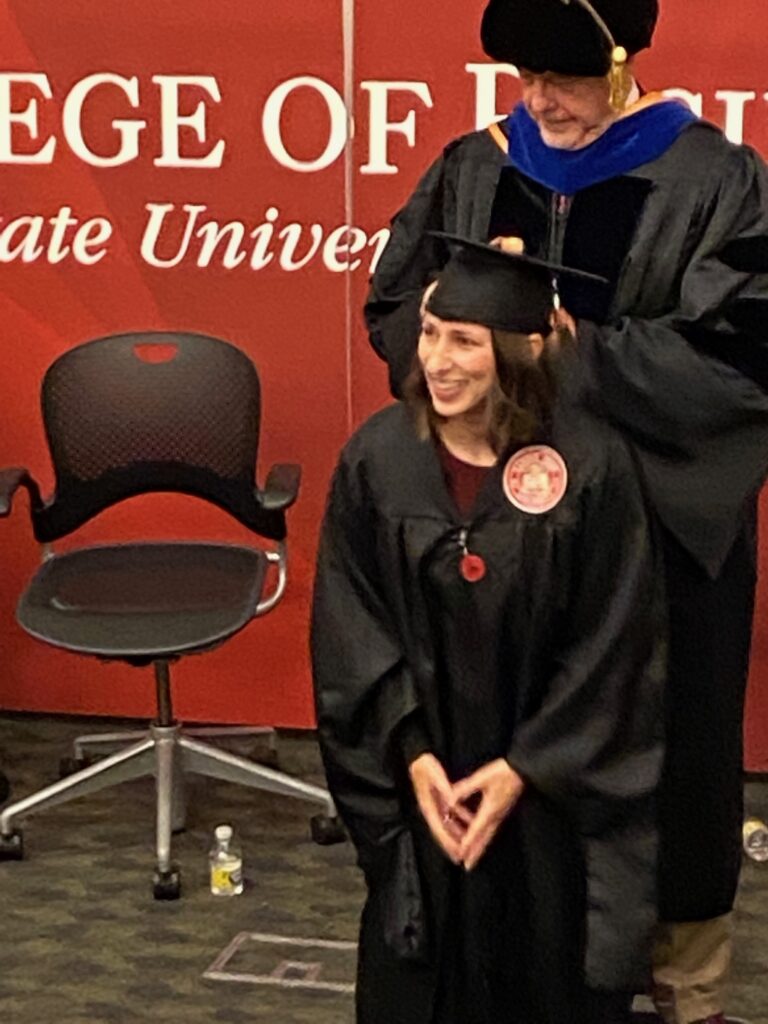
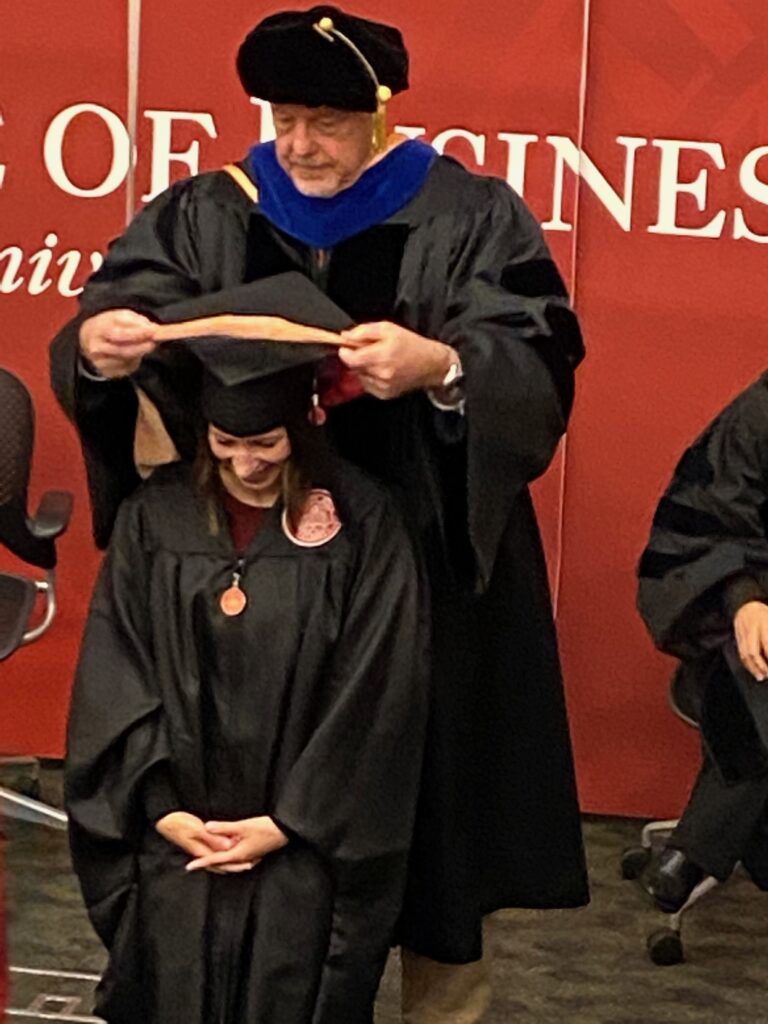
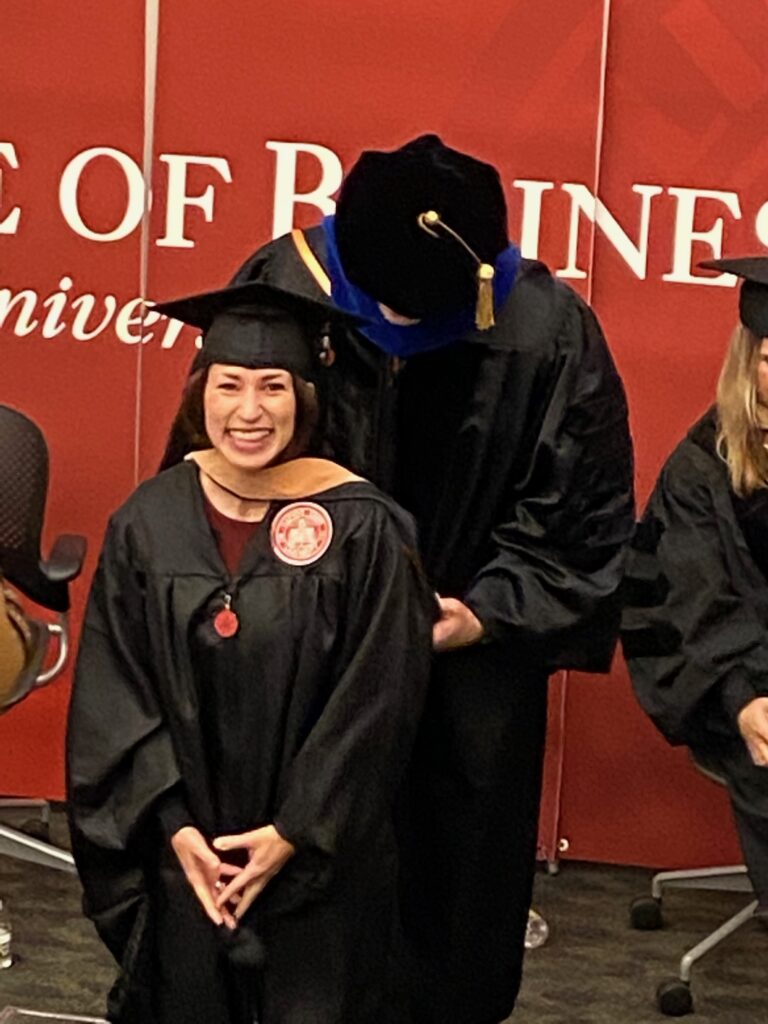
Pick your teams well
Much of the MBA program is about learning to work with others who are different from you, as well as learning to leverage your and others’ strengths. I learned this early on, and quickly partnered up with students who excelled in high-level math and knew how to easily manipulate a spreadsheet. These were often also the students who needed help conveying their work through writing. I quickly became each team’s writer and editor-in-chief, synthesizing and analyzing their data in written form. That said, I was careful not to become each team’s scheduler, organizer, or secretary. These tasks were often assumed by women–regardless of how aware we are we did it–and I knew I didn’t always want to take on the non-visual, non-promotable role within the group.
Racism is alive and well (in me)
During my first semester I was grouped with an international student. I was so green I didn’t understand that incorporating material outside of the textbook was actually a good thing. I also didn’t realize how frequently MBA students swap homework to make sure they’re on the right track, or otherwise outsource homework help. I instantly worried we’d be kicked out of the program for cheating unless we did absolutely everything by the book. And I told her so, in the least kind way: I implied she was cheating. I was completely clueless, and it didn’t hit me until a few months later that racism was likely at play, too. I had assumed I knew more than her, and that my way was superior. As it turns out, this particular student was pursuing not one, but two master’s degrees. She was much farther along in the program than I, so knew things outside of the textbook. She was also much, much smarter than I will ever be (see #1, above). I later wrote her an email to apologize, but never overtly spelled out my internalized racism. I didn’t know how to talk about it, and worried acknowledging it would be even more hurtful. She responded to my email and graciously accepted my apology, but the experience still makes me cringe thinking about my naivety and inconsiderate actions. As the semesters went on, I saw just how valuable my international teammates could be. I loved meeting over Zoom with classmates quarantining all around the world during our COVID days. I was and still am consistently humbled by how small my world is, and how brave others are for leaving theirs to pursue higher education. I’m grateful for the chance to get to know so many international students, and can laugh too, at our communication fumbles. (Case in point, my one friend would constantly tell me and others “Calm down, calm down, calm down.” I realized later it was his way of saying, “It’s all good, we’ve got this.” He was not, as I’d initially assumed, telling his female counterparts to calm down.)
Get to know your professors
As an older student in the program who also works at the University where I studied, I knew some of my professors going into each class. And I quickly got to know those I didn’t. I treated my relationships with professors as just as important as my relationships with peers. I also furthered my connection with the school’s dean. We would often pass in the Hall of Business, him leaving for the night while mine was just beginning. “Keep going, you’re doing great!” he’d tell me. “I’m still here,” I’d respond, and depending on my mood might add, “I may be your oldest and longest running student!” Then I’d continue on my way. On graduation night he shook my hand and said, “I remember your very first class, congratulations.” It felt like all the validation in the entire world wrapped up in one sentence.
A support system is everything
On my graduation night I whispered to Mike, “We did it.” And I meant it. This degree was a shared accomplishment, one fueled by his patience and attentiveness, his endless hours of solo parenting while I attended class or studied. He never once complained about my being absent, and if a child complained, he would tell them just how proud he was of my pursuing an MBA. My mom, too, was an integral support during my time in school. I often studied at her house, and she watched our kids more times than I could count. I came to rely on classmates too, including one hilarious text thread that buoyed my spirits and reminded me of deadlines I’d somehow completely overlooked.
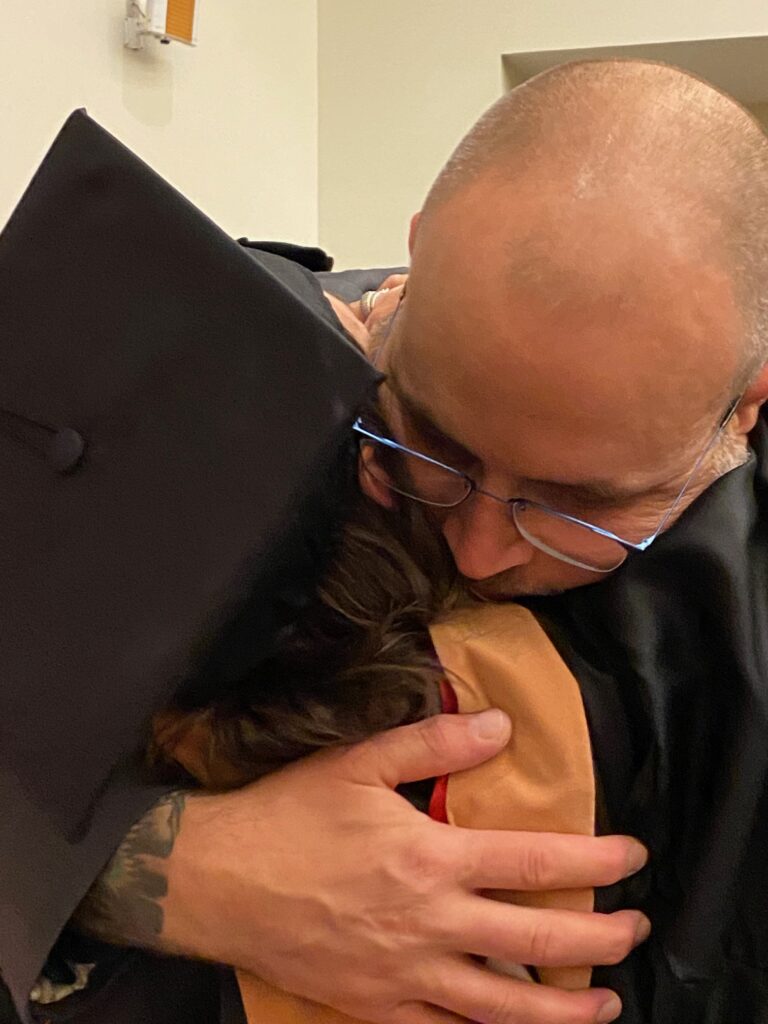
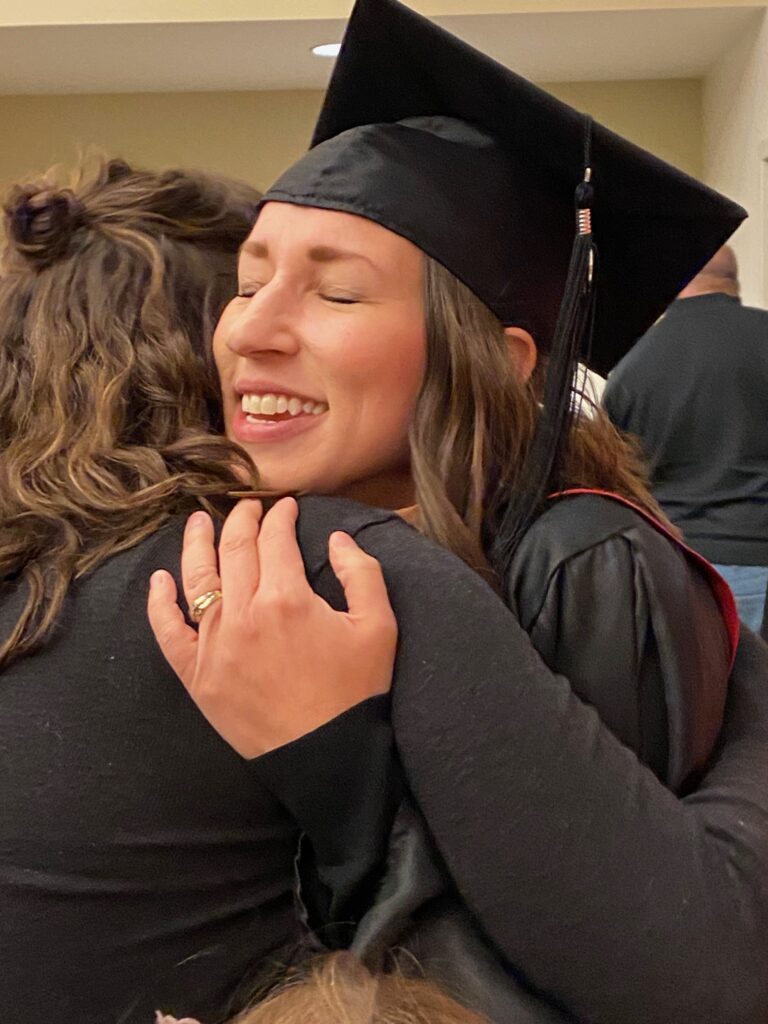
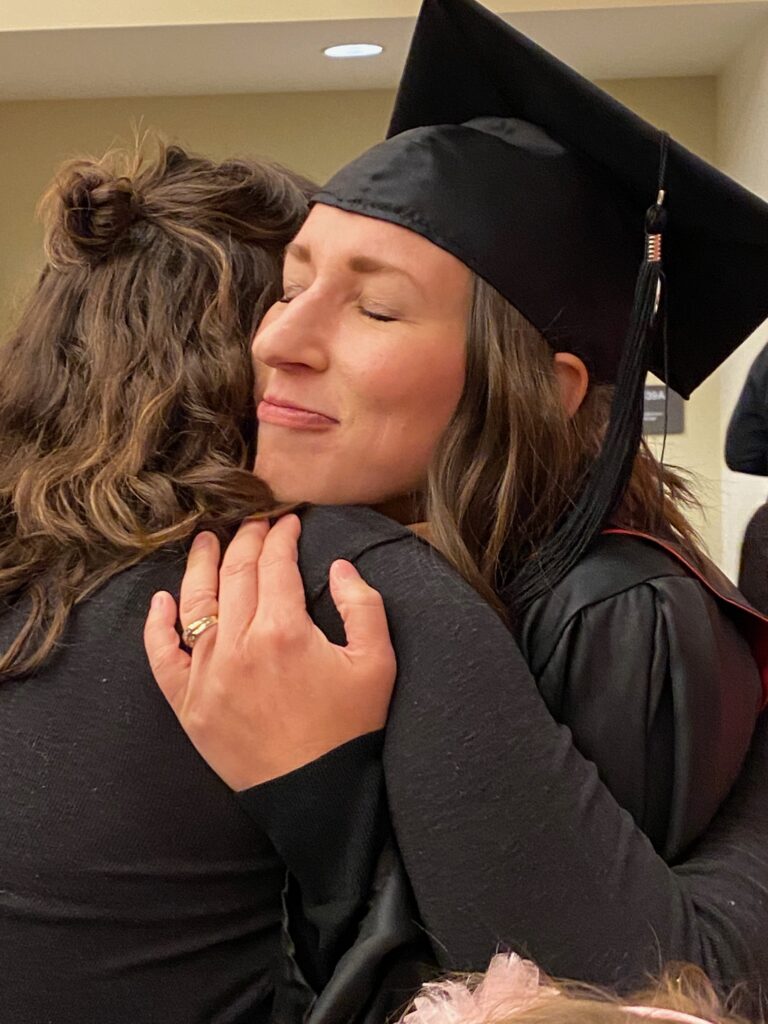
It’s okay to want things
When people ask me “What’s next?” I’m still not sure how to answer. I love my job, and I didn’t need an MBA to fulfill any external expectations. Instead, it was always a quiet whisper I chose to follow. I visited an open house for the program years before I began working at ISU, but the timing wasn’t right. Years later, I nervously applied. I wasn’t sure how I would manage–I was working full time and our kids were just 3 and 5 when I began–but I also knew “the time would pass regardless.” So, I began. And then I took a break. And then began again. Each time gaining more confidence in the decision. I am the last in my family to earn a master’s degree (a privileged club to join for sure), but as I hugged my mom and sister, it felt right, us women knowing our worth and not being afraid to ask for more. I’m hopeful both my children can someday see that anything is possible with a little grit and determination.

The end?
There’s a Nelson Mandela quote I think of often in regard to my MBA: “A winner is a dreamer who never gives up.” I’ve learned that I don’t have to be the best, I just have to be the most persistent. I don’t have to know the most, but I have to be unafraid to ask for help. And I don’t have to know why I should follow a dream. If it matters enough, I should pursue it anyways. Mike has made me promise I will soak up this accomplishment instead of rushing on to the next, as I am wont to do. I’ll be taking the spring semester to organize a 500-person gala for work and enjoying extra time spent with family. And then I’ll be ready for whatever comes next.
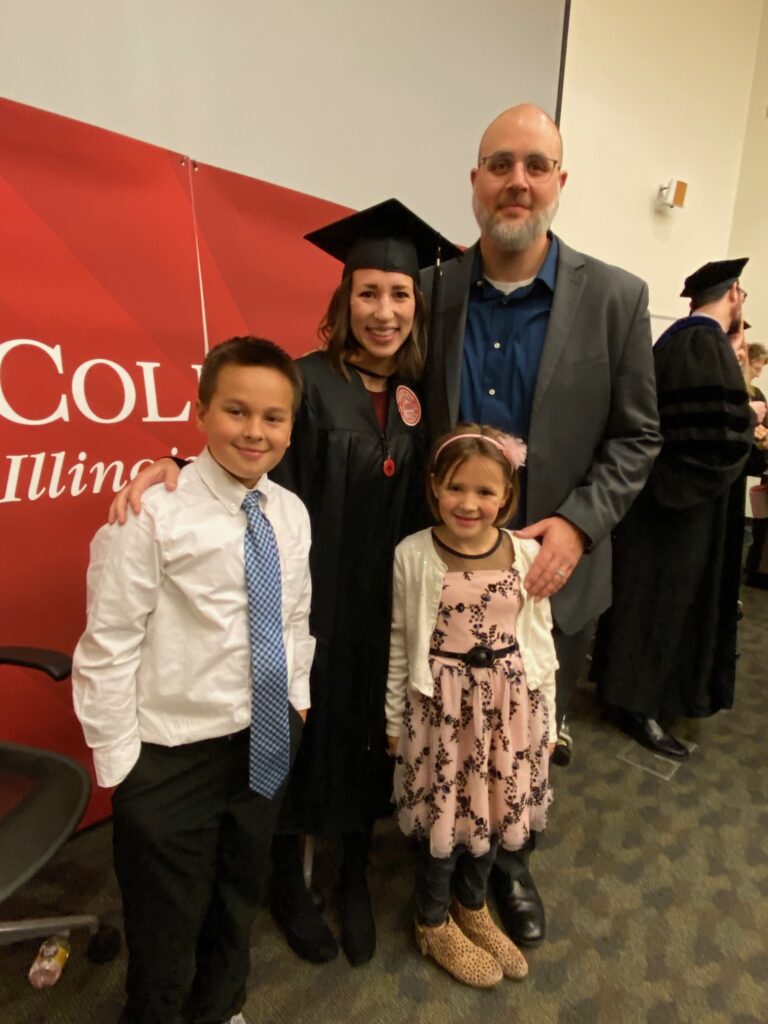


Outstanding accomplishment, Laura!
Laura,
Thank you for sharing your journey with us. You are inspiring, amazing, and truly an example for all to follow. This is a HUGE accomplishment and I agree with Mike – bask in it, soak it up and enjoy the feeling. Here’s to you, in this moment now!
All my love and congratulations!
Janice
Thank you Laura for sharing your thoughts and experiences in pursuing your MBA! Here’s to your persistence! And adorable family!!!